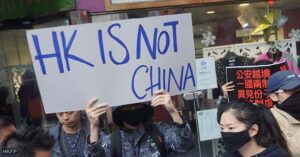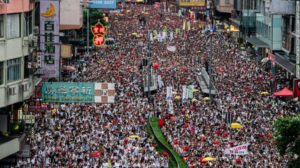Millions took to the streets of Hong Kong on June 12 in protest against a bill proposed by the government earlier this month that would allow for people of Hong Kong to be sent to mainland China for court trials.
The extradition bill, which has been suspended following the protests, aimed to allow suspects accused of criminal wrongdoing to be extradited to mainland China to stand trial. According to critics, this would severely erode Hong Kong’s own judicial independence.
Another concern raised by critics was that this would bring the former British colony more under China’s control and would leave residents exposed to China’s controversial judicial system, which is characterised by allegations of torture and human rights violations.
Hong Kong leader Carrie Lam suspended the bill after protests and tensions escalated. However, activists want the bill to be scrapped for good and demand assurance that it would never be considered again even after the protests were over. They initially demanded Mrs Lam’s resignation – which they later revoked.
Tensions rose again after Hong Kong Justice Secretary Teresa Chen, on June 22, ruled out a demand for an investigation into police brutality following violent clashes between the police and protesters on June 12 which left around 72 civilians and 21 police officers injured. A total of 32 protestors were arrested, five of whom have been charged with rioting offences. Eight protesters have been released; but people are demanding that the police release the rest of them, according to the BBC.
The ongoing protests through the month have seen thousands of people besieging the police headquarters building to continue their call for the bill to be completely scrapped, for the release of all detained activists and the investigation of police violence. The protests continued in the run up to the G20 Summit held on June 28-29 with hundreds marching to foreign consulates to lobby international governments about the city’s political crisis during the G20 summit.
There has been speculation that the passing of this bill could lead to the collapse of the “one country, two systems” model that Hong Kong has been following since 1997 when it was handed back to Chinese rule by the British, after their 99-year lease in the country had expired. At the time, the deal between China and Britain included an agreement that Hong Kong would enjoy a high level of autonomy, except in foreign and defense affairs, for 50 years.






 Print
Print Email
Email